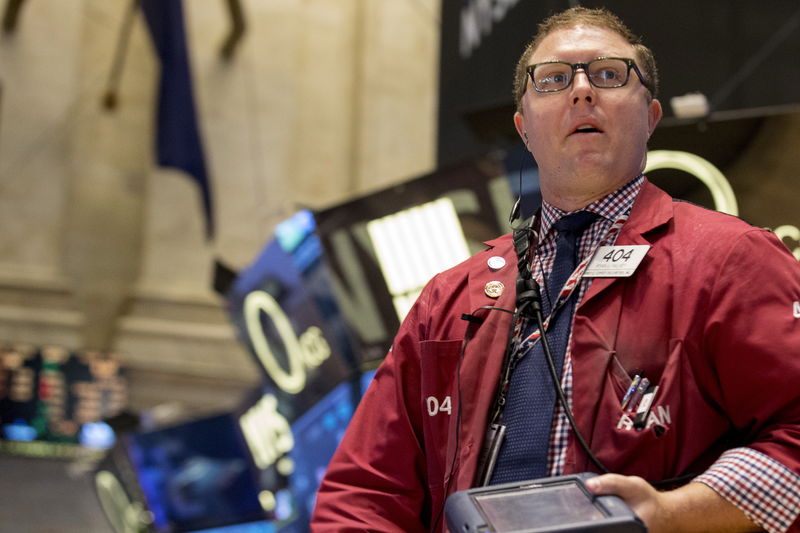Investing.com - Wall Street is set for a lower open on Monday as fears of slowing growth and a possible U.S. recession lead investors to shun risk assets.
But positive economic data out of Germany and relief over political developments stateside helped to calm the nerves that triggered the S&P 500’s worst day since January at the end of last week.
The blue-chip Dow futures fell 12 points, or 0.1%, to 25,558.5 points by 6:46 AM ET (11:46 GMT), the S&P 500 futures lost 2 points, or 0.1%, to 2,808.88 points, while the tech-heavy Nasdaq 100 futures traded down 24 points, or 0.3%, to 7,345.25 points.
Investors were still jittery after the U.S. yield curve inverted on Friday for the first time since 2007. The yield on the 10-year Treasury fell below the 3-month T-bill rate, an event that some analysts consider to foreshadow a recession, though that is not always the case. In normal conditions, a longer-term bond should carry a higher yield than a short-term one as there is a higher risk for a longer time period.
However, Rob Carnell, economist at ING, warned against reaching too quick a conclusion. “We suspect that drawing a recession conclusion from such data is not warranted until the 3M-10Y yield curve is inverted by a substantial amount,” Carnell said. “Just inverted, as today's markets indicate, doesn't do it for me.”
Chicago Federal Reserve Bank president Charles Evans also downplayed the yield curve inversion, given his confidence in the U.S. economic outlook.
“Some of this is structural, having to do with lower trend growth, lower real interest rates,” he said Monday at the Credit Suisse Asian Investment Conference in Hong Kong. “I think, in that environment, it's probably more natural that yield curves are somewhat flatter than they have been historically.”
Former Fed chair Janet Yellen also said on Monday that the yield curve may signal the need to cut interest rates at some point, but it does not signal a recession.
In a day with no major U.S. economic reports, German data helped traders breathe a sigh of relief as business confidence rebounded more than expected, posting its first improvement after six months of declines.
The yield curve also returned to its normal shape with the rate on the 3-month Treasury bill at 2.45% by 6:47 AM ET (11:47 GMT) while the benchmark 10-year note moved higher to 2.47%.
Also providing relief, Special Counsel Robert Mueller found no evidence of collusion between President Donald Trump's campaign team and Russia, and did not present enough evidence to warrant charging the president with obstruction of justice, U.S. Attorney General William Barr said on Sunday.
The end to the investigation removes what some see as a distraction from pressing economic questions such as infrastructure spending or trade relations with China.
In company news, Apple (NASDAQ:AAPL) is expected to lift the curtain on Monday on a secretive, years-long effort to build a television and movie offering, while Boeing (NYSE:BA) will brief more than 200 global airline pilots, technical leaders and regulators this week on software and training updates for its 737 MAX aircraft.
On the earnings front, Dropcar (NASDAQ:DCAR), Eastman Kodak (NYSE:KODK) or Winnebago Industries (NYSE:WGO) were among companies scheduled to report on Monday.
Outside of bonds and equities, the U.S. dollar index, which measures the greenback against six rival currencies, edged forward 0.1% to 96.12 by by 6:48 AM ET (11:48 GMT).
In commodities, gold futures rose 0.3% to $1,322.85 a troy ounce, while crude oil traded down 0.1% at $58.98 a barrel.
- Reuters contributed to this report.
